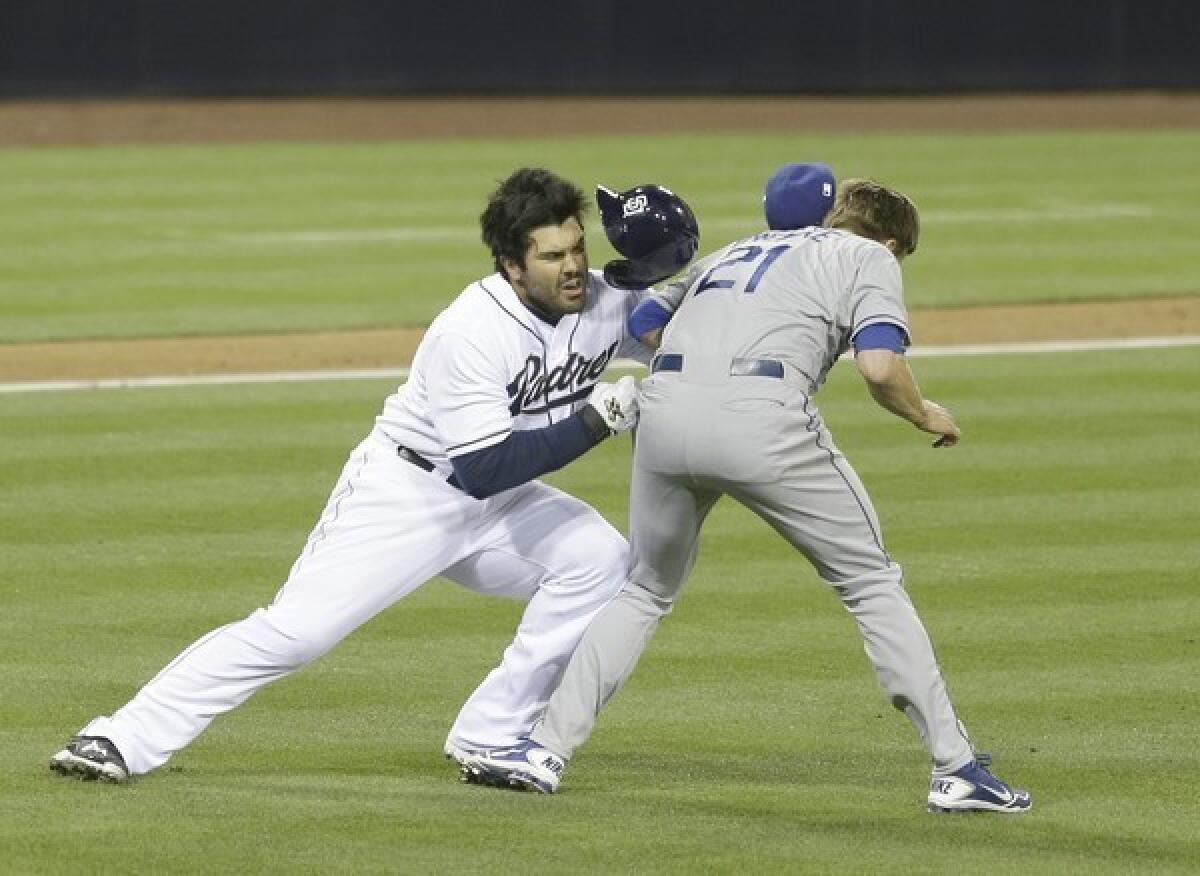Dodgers-Padres brawl: Thin-skinned men, needless violence

- Share via
Carlos Quentin of the San Diego Padres offered this excuse when asked why he’d started a fight on the field Thursday before a crowd that doubtless included hundreds of children.
“It’s a man’s game on the field,” the 30-year-old, Stanford-educated ballplayer said. “Thoughts aren’t present when things like this happen.”
I’m not a baseball writer, but I covered crime -- homicide, in particular -- for many years. So when I heard Quentin’s excuse, my thoughts went to the kind of violence we see on the streets of America every day.
On Thursday night we saw Quentin, in response to being hit by a pitch, attack the Dodgers’ Zack Greinke and break his collarbone. It was a clash of multimillionaires, but it wasn’t so different from the poor and working-class mayhem outside America’s ballparks: Men fighting over insults, challenges, various slights that, in some other context, might be brushed aside.
Thin-skinned men, schooled in an ethos that demands retaliation on the smallest pretext and which casts a posture of aggression -- a habit of not backing down and behaving thuggishly on behalf of your friends -- as some sort of manly honor, which it isn’t.
Just ask Jackie Robinson, whose legacy is commemorated in a movie that opened the day after the brawl at Petco Park. Robinson knew something about restraint in the face of slights. Quentin, Matt Kemp -- who exploded in anger and had to be restrained -- and anyone else who endorses this claptrap about a “man’s game” should be ashamed. You insulted Robinson’s memory on Thursday night.
But even without Robinson -- and even without the near-fatal beating of a Giants fan at Dodger Stadium two seasons ago -- you would think that baseball players would have some sensitivity to the freighted implications of acting like a thug.
Scores of young men -- most of them poor, most of them black and Latino, many of them Dodger fans -- still bleed to death in agony with regularity on the asphalt streets of Los Angeles, for example, leaving devastation in their wake:
Mothers who retreat for the rest of their lives into silent anguish.
Schoolmates so traumatized their hands shake and their hair falls out. Teachers, coaches, mentors left speechless with pain and incomprehension when the kid they’ve invested so much in suddenly turns up murdered, the victim of some gang brawl, some mindless, testosterone-fueled argument, very often with a retaliatory cast to it.
Los Angeles County is one of the most bloodstained places in the country in this regard. It has racked up more than 11,000 homicides since the year 2000 -- and, mind you, that was a relatively low-crime period in the region’s history. A young black or Latino man killed by what we euphemistically call “gang violence” remains, as ever, this area’s archetypal murder victim.
These dead men and boys come from the same urban neighborhoods that fill the city’s stadiums with sports fans, pour dollars into the Dodgers’ coffers. As it is, there exists this troubling continuum between gang life and professional sports. It’s not uncommon for murder victims in L.A. to breathe their last breath wearing the cap of some professional baseball team, which has dual standing as a gang identifier.
And then we are forced to witness players engage in this street-code-informed “traditional” fight culture on the baseball field. Really? You have to talk of settling scores? Charge a guy who hits you with a pitch? Empty the dugout in a mass fury of revenge? This from a bunch of privileged peacocks who make a big show of “mentoring youth” and visiting sick kids in hospitals?
Enough.
League officials should crack down. Fights on the field ought to be scrutinized for potential criminal charges, just as when men fight in bars and parking lots. Sportswriters should be scathing toward any suggestion of the inevitability of so-called manly impulses. Professional baseball should apologize to its fans and its country, and vow to take this seriously in the name of the nation’s tens of thousands of victims of retaliatory murder and assault.
And none of us should take a kid to a baseball game until they do.
What do you think? Share you view below.
ALSO:
Audrie Pott ‘tormented’ before suicide over alleged sex assault
Meningitis scare: From ‘fit as can be’ to life support in one week
San Diego police plan no action related to Padres-Dodgers brawl
jill.leovy@latimes.com
More to Read
Sign up for Essential California
The most important California stories and recommendations in your inbox every morning.
You may occasionally receive promotional content from the Los Angeles Times.













